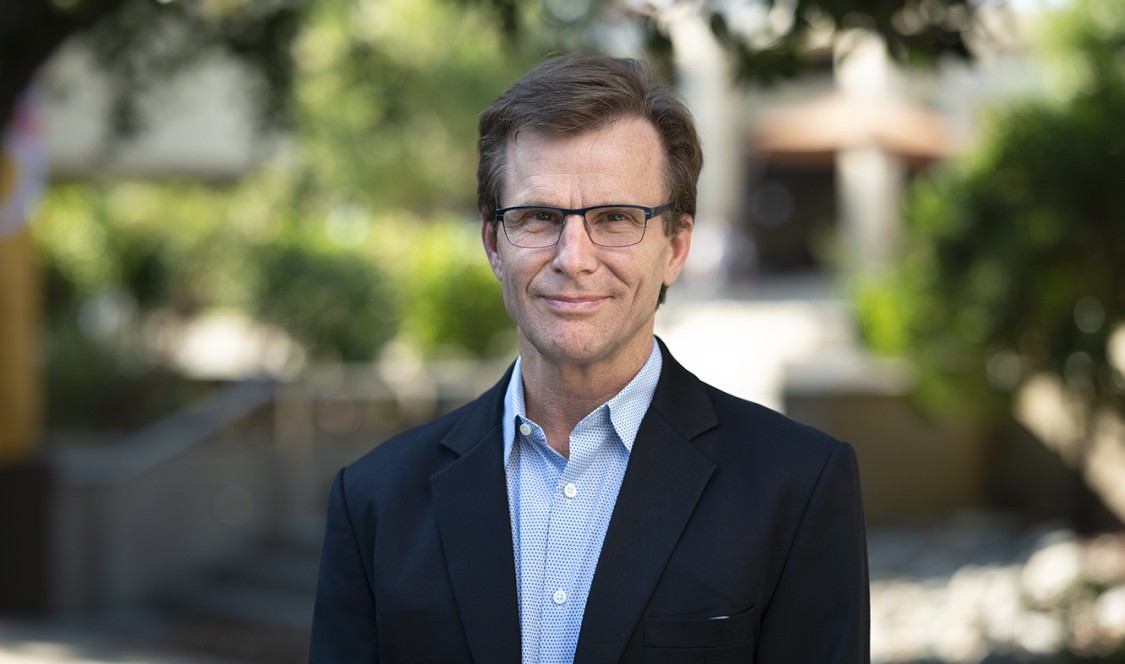Microdosing. Mystical experiences. Magic mushrooms.
These are not the typical topics one would expect a brain surgeon to explore, yet they were the basis for Dr. Daniel Kelly’s talk, “Past, Present & Future of Psychedelic-Assisted Therapy: A New Dawn for Mental Health and Neuroscience” at the Marian Miner Cook Athenaeum on Sept. 16.
As he began, Kelly ’82 seemingly read the minds of many in the audience, when he asked, “Why would a neurosurgeon get into this line of work?”
His answer: “Because I think that this is going to be a game changer,” predicting that the “psychedelic renaissance” will “transform the neurosciences and behavioral healthcare.”
A biology and chemistry major at CMC, Kelly is director and founder of the Pacific Neuroscience Institute at St. John’s Providence, which is focused on cognitive, memory and mood disorders. Internationally recognized for his work advancing techniques of minimally invasive “keyhole” and endoscopic brain tumor surgery, he also plays a major role in expanding clinical services and research avenues at the Pacific Brain Health Center and the Treatment & Research in Psychedelics (TRIP) program.
In his talk, Kelly offered an overview of his work with the Brain Health Center and TRIP, which is dedicated to the appropriate medical use of psychedelic-assisted therapy. “Our initial focus was on dementia and memory issues,” he said. “And then more recently we’ve been focused on what we would call mood disorders, depression, anxiety, addiction—and this is where the TRIP program came into being.”
Kelly further explained that while his “day job” is brain surgery, his work with the Pacific Neuroscience Institute, is “about … advancing the neurosciences and promoting brain health through novel research and innovative clinical trials.”
He said that PTSD, depression, anxiety, and addiction “dwarf” other neuroscience ailments, and more importantly “for many patients, our current therapies really have limited success, side effects, and they just don’t last very long—they lack durability.”
This realization led Kelly and his team to recognize the utility of “psychedelic-assisted therapies” with “shamanistic roots,” such as the naturally occurring psychedelic, Psilocybin, which is produced by fungi. Kelly said these therapies “offer a paradigm shift, with a more expansive psycho-spiritual approach that promotes brain plasticity and connectivity.”
Kelly said TRIP’s mission is to develop safe, effective, and FDA-approved psychedelic-assisted therapies for different disorders. “And right now, we’re doing it through clinical trials,” he said. “We really want to try to understand some of the scientific questions around how do these drugs work? What are the underlying mechanisms?”
However, Kelly cautioned that Psilocybin therapy is not to be taken lightly. It requires “careful patient selection and screening, pre-treatment preparation, experienced clinicians, and the appropriate setting monitoring and safety measures.” He noted that “the mantra that is given to individuals who go on these journeys is trust.”
In the near future, Kelly sees psychedelic-assisted therapies being deployed to help patients address their grief, especially in the COVID era. He also predicts that the FDA will approve MDMA (a.k.a., Ecstasy or Molly) “within the next year or two and Psilocybin for depression, hopefully by 2025.”
“I think this is one of the most interesting areas within the neurosciences right now,” he concluded.
View the video of Dr. Kelly’s talk, “Past, Present & Future of Psychedelic-Assisted Therapy: New Dawn for Mental Health and Neuroscience.”

